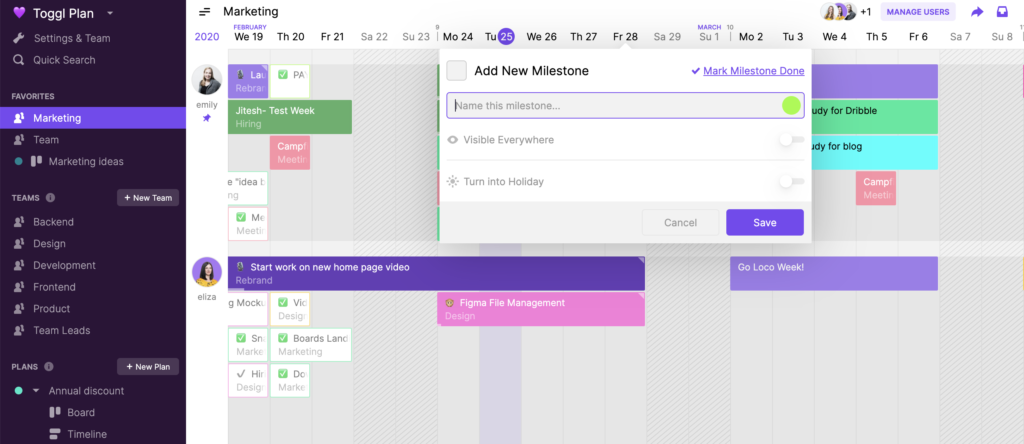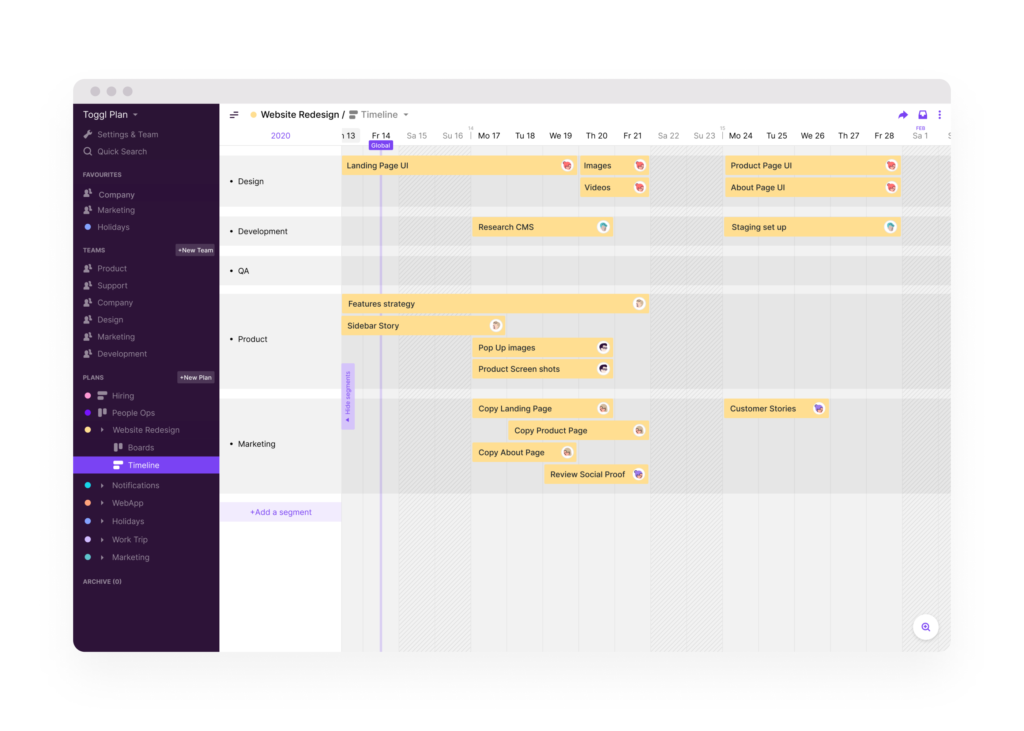It’s easy to blame employees when they miss a tight deadline. But if this happens all the time, the problem might be the way their deadlines or tasks are structured. Employees can only do their best work if they have a supportive, organized environment to work in.
Employers can make it easier for employees to meet deadlines by improving the work environment. Use software programs to delegate tasks and track completion rates. If someone fails to finish their job on time, follow up and show them there are consequences to their actions.
While there will always be a few bad apples who deliberately procrastinate, most employees genuinely want to meet short deadlines and do their job well. If you give them the right tools to do their best, they will often go above and beyond your expectations. Once you understand why team members miss deadlines, you can change the workplace dynamic and set your team up for success.
1. Unclear Deadlines
Problem: Sometimes, your team is more than happy to put in the work and stay late to meet a deadline. The problem is they have no clue when the project is due. If a manager is unclear about an actual deadline, it is impossible for team members to meet it.
Solution: The easiest way to fix this problem is by using software programs like Toggl Plan to clearly define deadlines. For your deadlines to be effective, they also need to be achievable. To do this, break up larger goals into smaller milestones.

Whether you are creating a list of milestones or building a goal sheet, you need to communicate the timeline to your team. While a group email or a sticky note might work for minor deadlines, they can easily get lost. An online platform provides an alternative as a constant reminder.
Through Toggl Plan, you can divide tasks among different team members and set a deadline for the completed project. Then, you can break down your larger deadlines into smaller, more workable milestones. Since everyone can log in and check the deadlines at any time, all of your team members will clearly understand what to do and when they have to finish.
When you set these milestones, they must always have a clear scope. Team members need to know the project deliverables if they are going to accomplish them. Avoid scope creep by determining the specific deliverables, milestones, and tasks you need completed on your project.
2. The Team Needs Consequences
Problem: When a team first misses a deadline, they are afraid their boss will be upset. If nothing happens, they quickly realize they can stop meeting deadlines whenever they feel like it. Unless they have a consequence for failure, some people will never perform their best work.
Solution: Many bosses forget about the importance of accountability. When you are working with adults, you assume everyone around you realizes they have to do their work to keep their job or get a future promotion. Unfortunately, there are plenty of team projects which fall apart because no one is held responsible for their actions.
Accountability is all about being responsible for your results and choices. This concept is especially important when you work in a team situation. If other team members can’t rely on someone to do their job or regularly have to do another employee’s work, they will feel resentful and stop putting in as much effort on the team.

One problem with accountability is the way teams are structured. When everyone is responsible for the results, it is far too easy to assume someone else will do it. Before long, no one is completing tasks because they think the next person will take care of it.
If you are constantly struggling to meet tight timelines, it is time to give your team some consequences. When team members fail to complete their tasks, they need to realize their behavior is unacceptable.
But remember, it’s only fair to hand out consequences if you have already set your expectations. Team members have to know they failed to meet expectations before they receive consequences. Otherwise, they will feel resentful and won’t want to remain a part of the team.
To make your team members accountable, remember to set clear expectations. Check on how your team members are doing and provide coaching if they need help. If you have set clear expectations and offered support as needed, then follow up with consequences when they miss a tight deadline.
Also, ensure there are positive consequences in place for those who do exceptional work or go above and beyond the call of their duties.
3. Disorganization
Problem: Meeting a tight deadline can be difficult in the best of circumstances. If the team is disorganized, then they can’t track who has finished which projects and which tasks still need to be completed.
Solution: Your team needs a system to track your deadlines and work status. The last thing you want is to have multiple people working on the same task, or no one working on it at all. Being disorganized is a common mistake in any industry, but it can quickly derail your entire project.
Toggl Plan can make staying organized easier than ever before. Among its other tools for planning and tracking work, this platform allows you to use Gantt charts with your team. The chart can be shared among team members and easily updated online, so everyone can see exactly how close they are to achieving the deadline.

Your Gantt chart can essentially become a blueprint for how to meet deadlines. This visually appealing format is easy to use and allows you to automate your project’s progress. Basically, it is a time-saving system for organizing your team.
The Gantt chart’s scheduling and task visualization help show which tasks are necessary before other’s can be accomplished as well as which tasks will take the longest to finish. The system also shows project reports, so everyone can see the schedule, goals, budget, and milestones. With this type of program, you can easily get everyone on the same page and working toward the same objectives.
4. Performance Issues
Problem: For a team to function properly, everyone must do their part. If one person is slacking, it affects the rest of the team’s morale. These performance issues can even lead to the downfall of an entire project.
Solution: Everyone needs to understand what the goal is and why they need to accomplish it. If team members know the answer to why deadlines are important and why their job matters, they are more likely to finish their tasks. Unlike children, adults always want to know why they are doing something rather than simply being told to do it.
Whenever someone doesn’t do their job, take a step back and consider the situation. Have you done everything possible to set your team up for success? Do they know why their role is important and necessary?

If you can’t see an obvious reason why they aren’t finishing their task, try talking to them. It is entirely possible they are overwhelmed or have another issue happening behind the scenes. When someone can’t possibly finish the task on time on their own, they might even give up entirely.
Sometimes, it seems impossible for a team member to be overwhelmed by the amount of work. Try asking questions about how you can help and provide some coaching based on your own experience. If they really want to put in their best work, they might be failing because they simply don’t have the skills and tools they need.
As long as you know the team member truly wants to do their best and tries their hardest, keep doing what you can to help them. Provide them with constructive feedback, so they are prepared to tackle the tasks ahead of them. They might be unable to do a certain task today, but they can learn how if they are given a chance.
5. Unrealistic Deadlines
Problem: You can work with the best team in the world. But if the deadline is completely unrealistic, they won’t be able to achieve it. Unrealistic deadlines can also discourage workers from even bothering to try because they know they won’t be able to make it happen.
Solution: There is a difference between something being optimistic and completely impossible. When team members are given an impossibly high goal, they can become disheartened and lose interest in their work. On the next project, they won’t believe any deadline is realistic because of their past experience on this project.

The best thing you can do is prioritize more effectively. Be honest about how long each step will take and figure out if you can start some of the later steps early. If your time estimates are overly optimistic, the overall timeline will be too short.
Whenever you are dealing with multiple team members or a large project, handling all of the milestones and different steps is often a painstaking effort. Make your life easier by using Toggl Plan to set the project deadline and each milestone.
Take Charge of Your Deadlines
Most team members want to put in their best work day in and day out. As the team’s manager, your job is to figure out where they are going wrong and how to fix the problem. There are a few common reasons why people miss tight deadlines, and many of these issues can be sorted out by a proactive team leader.
Start by looking at your overall project and checking to see if the deadline is realistic. Then, give your team members clear expectations and coach them as needed. If they fail to meet realistic expectations, follow up with consequences.
You can set your team up for success by giving them the right tools from day one. With Toggl Plan’s platform, you can help your team stay organized and on top of the deadline. Find out more information about successfully managing team projects through Toggl Plan’s blog articles.
Logan Derrick is a full-time business writer and content marketing strategist. For years, he has worked closely with several project management professionals, learning from them and increasing his own knowledge of the industry. Having held multiple management positions in fields ranging from customer service to marketing, Logan has found a passion for helping others learn about project management, marketing, and the powerful tools available to professionals today.


